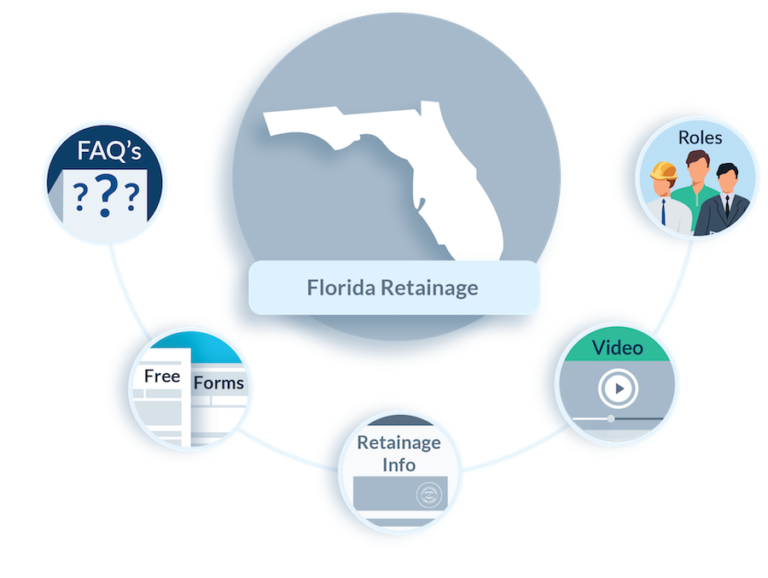Florida Retainage Requirements
- Private Jobs
- Public Jobs
- Top Links
No Retainage Rules
Florida statute does not regulate retainage on private construction projects.
5 Percent
On public projects in Florida, retainage cannot exceed 5% of each progress payment. (Effective October 1, 2020)
30 Day Pay Period
For projects estimated to cost less than $10 million, retainage funds must be released within 30 days after substantial completion.
For projects of $10 million or more, the retainage deadline is also 30 days from substantial completion, but may be extended by contract to a maximum of 60 days.
There is a Process to Recover
Yes, there is a specific recovery process set out by Florida law.
Retainage, also called “retention,” is an amount of money “held back” from a contractor or subcontractor during the course of a construction project. In general, retainage serves two main purposes:
- To provide an incentive to the contractor or subcontractor to complete the project; &
- To give the owner some protection against problems like liens, contractual defaults, delays, and more.
In most states, laws exist to regulate how the parties use the retainage concept, mostly protecting some parties against abuse of the tool from others. The following are resources, legal information, and answers to frequently asked questions about Florida’s retainage requirements.
Florida’s retainage limits & deadlines
Florida retainage statutes only apply to public works projects where the original contract price is $200,000 or more. Retainage practices on private projects aren’t regulated in Florida. Retainage on private projects will be governed by the terms of the contract.
UPDATE: New Florida retainage requirements for public projects went into effect on October 1, 2020. Here’s a snapshot of the changes:
- Retainage limit is now 5% for the lifetime of the project
- Reduction in retainage percentage no longer required at 50% completion
- Provision allowing the contractor to request early release of retainage was removed
All new projects advertised to bid after the effective date will be held to the updated requirements.
On public projects, the maximum amount of retainage that can be withheld is 10% from each progress payment. Upon 50% of completion, the public entity must reduce the amount of retainage withheld to 5% of the remaining progress payments. A contractor can elect to withhold more than 5% based on the subcontractor’s performance.
Once the project has reached substantial completion the deadline for the public entity to pay retainage depends on the overall contract price of the project:
- Projects under $10M: within 30 days
- Projects over $10M: within 30 days, unless extended by contract, not to exceed 60 days
If a good faith dispute exists, the public entity may withhold up to 150% of the value of the work to be completed. Once retainage has been released to the prime contractor, retainage must be paid to any subcontractors within 10 days. In turn, subcontractor must pay their subs and suppliers within 7 days of receipt of retainage. Failure to timely release retainage payments will be subject to an interest rate of 1% per month.

